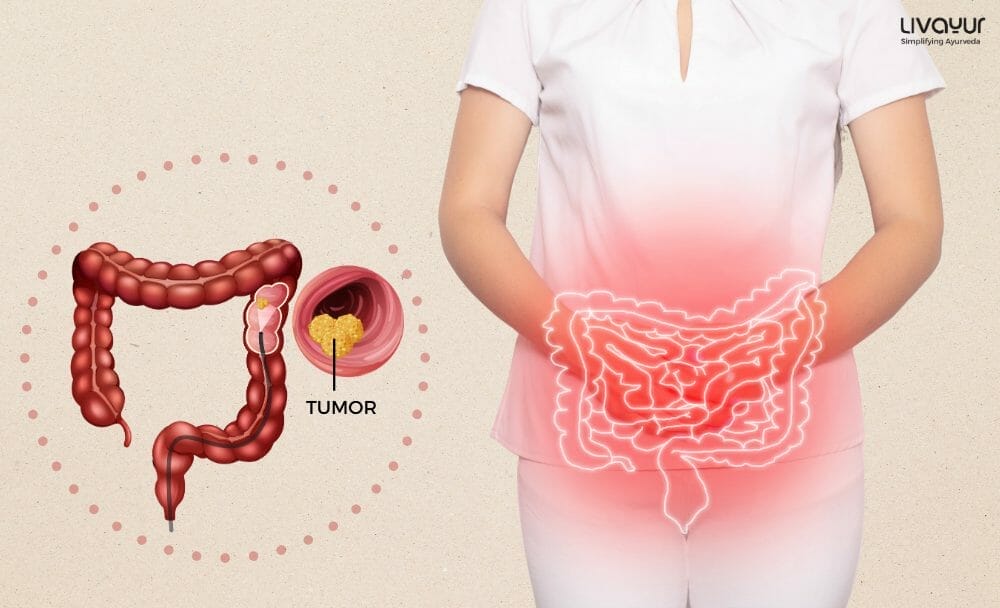This article is reviewed by an expert

“न चैनं सहसाक्रम्य जरा समधिरोहति । स्थिरीभवति मांसं च व्यायामाभिरतस्य च ॥
Na chain sahasaakramya jara samadhirohit I sthiribhavati maans vyaayaamabertsyach II
An individual who exercises regularly has a stable body and less chances of getting attacked by illnesses that come with old age, easily.”
Colorectal cancer affects the colon and rectum, which are part of the digestive system. It can be a scary diagnosis, but early detection and treatment can significantly increase the chances of successful treatment and long-term survival. This article explores the symptoms to look out for, the potential causes and risk factors of colorectal cancer, and ways to reduce your risk of developing this disease. So, let’s get started!
What is colorectal cancer?
Also known as bowel cancer, colorectal cancer affects the colon and rectum. The colon and rectum in the large intestine absorb water and electrolytes from food to form solid waste. [1]
Colorectal cancer typically starts as small, noncancerous clumps of cells. They appear on the colon or rectum’s inner lining. Over time, they can become cancerous and begin to grow and spread. If left untreated, colorectal cancer can spread to other body parts, such as the liver and lungs, and become much more difficult to treat. [2] [3]
What are the symptoms of colorectal cancer?
Here are some common symptoms of colorectal cancer to look out for:
- Changes in bowel habits
It includes persistent diarrhea, constipation, or changes in the stool’s size, shape, or consistency. [4] - Blood in the stool
It may be bright red or dark and visible in the toilet bowl, toilet paper, or stool itself. [4] - Abdominal pain or cramping
It can include persistent discomfort, bloating, or cramping in the abdominal area. [4] - Unexplained weight loss
If you’re losing weight without trying, it could be a sign of colorectal cancer or another underlying health issue. [4] - Anemia
In this condition, your body doesn’t have enough red blood cells. It can lead to fatigue, weakness, and shortness of breath. [4]

What are the causes of colorectal cancer?
Here are some common causes and risk factors of colorectal cancer to be aware of:
- Age
Colorectal cancer’s risks increase with age. These cases usually get detected in patients around the age of 50. [5] - Family history
If you have a family history, particularly in a first-degree relative (parent, sibling, or child), your risk of developing the disease is higher. [5] - Lifestyle factors
Certain lifestyle factors, like smoking and heavy alcohol consumption, can increase the risk of colorectal cancer. [5] - Medical conditions
Certain medical conditions, like inflammatory bowel disease (IBD) and ulcerative colitis, can increase your risk of developing colorectal cancer. [5] - Previous cancer history
If you’ve had cancer in other parts of your body, particularly the ovaries, you may have an increased risk of developing colorectal cancer. [5] - Genetics
Colorectal cancer has a high genetic heterogeneity, meaning its susceptibility increases within a family. [10]
Colorectal cancer diagnosis
If you’re experiencing symptoms of colorectal cancer or face increased risk due to family history or other factors, your healthcare provider may recommend a screening test. Here are some common diagnostic tests used to detect colorectal cancer:
- Colonoscopy
During a colonoscopy, a flexible tube with a camera at the end is inserted into the rectum and colon to look for abnormalities or polyps. [6] - Fecal occult blood test (FOBT)
It is a non-invasive test that checks for hidden blood in the stool. If blood is detected, further testing may be needed. [6] - Sigmoidoscopy
It is similar to a colonoscopy but only examines the lower part of the colon and rectum. [6] - Virtual colonoscopy
It is a non-invasive test that uses a CT scan to create images of the colon and rectum. [6]
Stages of Colorectal Cancer
There are 5 stages of colon cancer and some stages have sub-sections. The following are included in the colon cancer stage system:
Stage 0: This is when there are abnormal or precancerous cells in your mucosa, in the innermost layer of the colon wall.
Stage I: This is when the cancer has penetrated the intestinal wall but hasn’t gotten past the muscular coat or into nearby lymph nodes.
Stage II: This is when the cancer has progressed farther into the intestinal wall but has not reached any neighboring lymph nodes. However, there are 3 subsections to Stage II Colon cancer:
- Stage IIA: The cancer has penetrated most of your colon wall, but it hasn’t reached the outer layer yet.
- Stage IIB: The cancer has penetrated the wall or into the outer layer of your colon.
- Stage IIC: An adjacent organ has been affected by cancer.
Stage III: Your lymph nodes have been affected by colon cancer at this point. Similar to Stage II colon cancer, Stage III colon cancer is divided into three substages:
- Stage IIIA: One to four lymph nodes may have been affected by cancer that originated in the first or second layers of your colon wall.
- Stage IIIB: Only one to three lymph nodes are affected, but additional layers of your colon wall are affected by the cancer. Stage IIIB colon cancer also refers to cancer that has progressed to four or more lymph nodes but affects fewer layers of the colon wall.
- Stage IIIC: Four or more lymph nodes and the outermost layer of your colon are affected by cancer. Cancer that has progressed to an organ close by and one or more lymph nodes also falls under Stage IIIC.
Stage IV: Cancer has spread (metastasized) to other areas of your body, such as your liver, lungs, or ovaries:
- Stage IVA: In this stage, cancer has spread to one organ or to lymph nodes that are farther or more distant from your colon.
- Stage IVB: The cancer has moved to more than one distant organ and more lymph nodes.
- Stage IVC: Cancer affects distant organs, lymph nodes, and abdominal tissue.
Treatment of colorectal cancer
From an Ayurvedic point of view, colorectal cancer is believed to be caused by imbalances in the Doshas or body energies. Treatment typically focuses on restoring balance and supporting the body’s natural healing processes. Here are some Ayurvedic treatments that may be used to help manage colorectal cancer:
• Herbal remedies
Ayurvedic practitioners may recommend turmeric, ginger, and Ashwagandha to reduce inflammation and boost the immune system. [8]
• Detoxification
Ayurveda emphasizes the importance of removing toxins from the body to restore balance and promote healing. It may involve eliminating processed food intake and consuming more fresh fruits and vegetables.
• Yoga and meditation
Standing forward bend and Cat-Cow Pose can help reduce stress and promote relaxation. These measures can have a positive impact on overall health and well-being. [9]
• Panchakarma
It is a traditional Ayurvedic treatment involving cleansing and rejuvenating therapies to help balance the doshas and support healing. [7]
Prevention of Colorectal Cancer
Regardless of being one of the common conditions, colorectal cancer can be prevented. Studies show that about 75% of cases can be avoided by lifestyle changes. (11) Here are some measures to prevent colorectal cancer:
- Maintain a healthy weight
- Maintain a healthy diet (including whole grains and fiber)
- Getting screening tests done regularly is one of the reliable ways of preventing colon cancer. This helps detect cancer before it has grown and can still be treatable. Some screening options are colonoscopy and home stool tests.
- Be Physically Active
- Quit Smoking
- Limit Alcohol (it’s best to not consume at all)
Lifestyle Factors That Affect Colorectal Cancer
Many studies indicate that up to 75% of cases of colorectal cancer can be prevented by making lifestyle changes, alone. (11) Some habits that can affect colorectal cancer are:
- Less physical activity
- Unhealthy diet (low in fruit and vegetables)
- A low-fiber and high-fat diet, or a diet high in processed meats
- Overweight
- Alcohol consumption
- Consuming tobacco
Conclusion
Colorectal cancer is a serious disease that can significantly impact your health and well-being. Awareness of the common symptoms, causes, and risk factors is important. Talk to your healthcare provider about screening if you’re at increased risk. Early detection holds the most chances for successful treatment and recovery.
Medical treatments like surgery and chemotherapy are the first line of defense against colorectal cancer. Ayurvedic treatments should be used with conventional medical treatments, such as surgery and chemotherapy, not as a replacement. Talk to your healthcare provider before starting any new treatment or supplement regimen.
Disclaimer: The information provided here is not intended to replace professional medical advice or treatment.
FAQs
What is colorectal cancer staging?
Colorectal cancer staging determines how advanced the cancer is and if it has spread to other body parts.
What is colorectal cancer screening?
Colorectal cancer screening is checking for signs of cancer before any symptoms appear. Screening tests can help detect cancer in its early stages when treatment is most effective.
What are colorectal cancer risk factors?
Colorectal cancer risk factors include age, a family history of colorectal cancer or polyps, a history of inflammatory bowel disease, and lifestyle habits like heavy alcohol use. [5]
What is the colorectal cancer survival rate?
The colorectal cancer survival rate varies depending on the cancer stage at the diagnosis. Treatment options and individual factors such as age, overall health, and response to treatment can also affect the survival rate.
What are the symptoms to visit a doctor?
It is advisable to consult medical attention if you notice blood in your stool, combined with abdominal pain, aches, or cramps that don’t go away.
Can anyone develop colorectal cancer?
Colon or rectal cancer can strike anyone, male or female. The age of presentation is often 50 years or more if there is no family history of colorectal cancer (the mean age is 65–70 years). The age of diagnosis may be lower when there is such a family history. These conditions show that the onset of colorectal cancer is influenced by both genetic and environmental factors.
Is colon cancer hereditary?
Colon cancer can be hereditary, however, generally, only 5-10% of colon cancers are hereditary. (11)
References:
- Colorectal Cancer—Patient Version.
- Analysis of Deep Feature Extraction for Colorectal Cancer Detection.
- Metastatic Colorectal Cancer May Spread Early in the Disease, Study Finds. 22 July 2019
- Colon Cancer Symptoms.
- Colorectal Cancer Prevention (PDQ®)–Patient Version.
- Colorectal Cancer Screening (PDQ®)–Patient Version.
- Ayurvedic Approach in Chronic Disease Management. 28 March 2020
- Role of Indian Herbs in Boosting Immunity. 2021
- Exploring the therapeutic effects of yoga and its ability to increase quality of life.
- Genetics of colorectal cancer.
- https://www.ncbi.nlm.nih.gov/pmc/articles/PMC4415727/
















